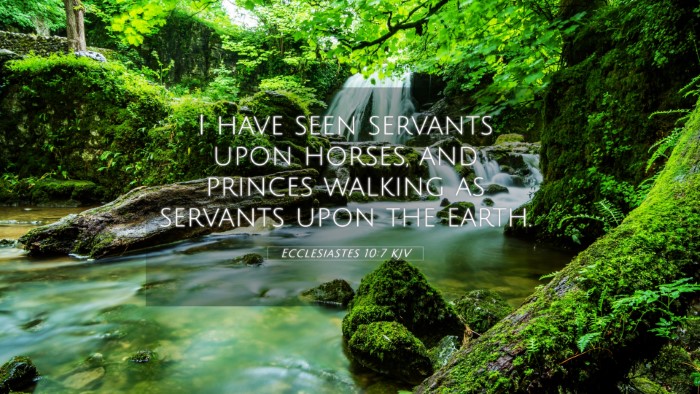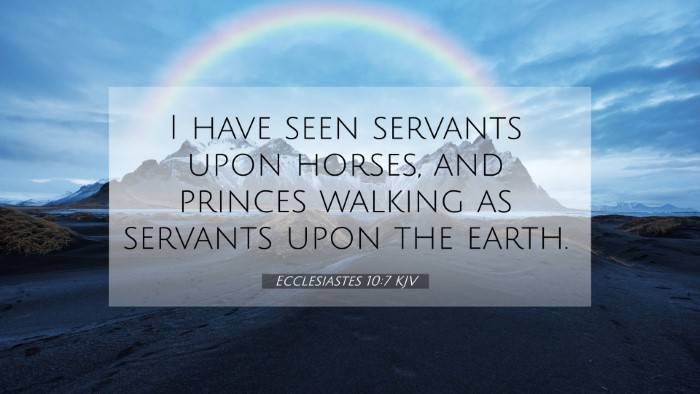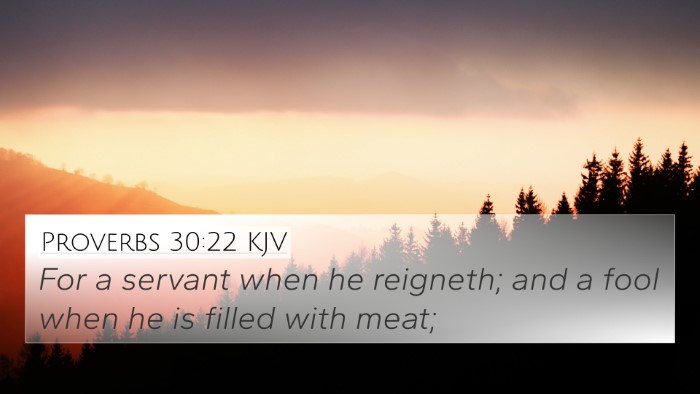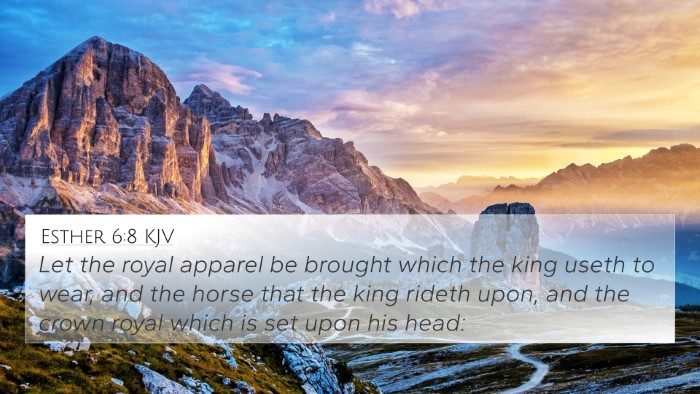Understanding Ecclesiastes 10:7
Verse: "I have seen servants upon horses, and princes walking as servants upon the earth." (Ecclesiastes 10:7)
Overview of Ecclesiastes 10:7
Ecclesiastes 10:7 presents a clear dichotomy in social status and the inversion of roles that can occur in life. The verse illustrates a curious and ironic observation of social order, where those typically in power or higher positions (as represented by princes) are reduced to servitude, while those without social standing (servants) rise to prominence.
Commentary Insights
-
Matthew Henry: Henry remarks that this verse speaks to the unpredictability of life and the transient nature of power. He emphasizes that the divine providence can reverse societal norms, suggesting that humility is a necessary virtue, as one's status can change at any moment.
-
Albert Barnes: Barnes draws attention to the moral implications of the verse. He interprets the shifting of roles as a reminder that external appearances can be deceptive. The wisdom of the world may not align with the true order established by God, challenging readers to seek a deeper understanding of divine justice.
-
Adam Clarke: Clarke offers an analysis paralleling the verse with circumstances surrounding leaders and the common people. He discusses historical instances where the wise or foolish could be found in unexpected positions, reinforcing the idea that God has ultimate sovereignty over human affairs.
Thematic Connections to Other Bible Verses
This verse can be linked to several others that expand on the themes of humility, the nature of power, and God’s sovereignty over human affairs:
- Proverbs 22:29: "Seest thou a man diligent in his business? he shall stand before kings; he shall not stand before mean men." - This verse illustrates the potential for unexpected elevation based on God-given talents.
- Luke 14:11: "For whosoever exalteth himself shall be abased; and he that humbleth himself shall be exalted." - Echoes the message of humility and the reversal of societal standings.
- 1 Samuel 2:7: "The LORD maketh poor, and maketh rich: he bringeth low, and lifteth up." - Reflects God's control over worldly success and status.
- Matthew 20:16: "So the last shall be first, and the first last: for many be called, but few chosen." - Further emphasizes the theme of reversal in God’s kingdom.
- James 4:10: "Humble yourselves in the sight of the Lord, and he shall lift you up." - Highlights the virtue of humility and its reward by God.
- Isaiah 40:24: "Yea, they shall not be planted; yea, they shall not be sown: yea, their stock shall not take root in the earth: and he shall also blow upon them, and they shall wither, and the whirlwind shall take them away as stubble." - Discusses the temporary nature of human power.
- Revelation 3:17: "Because thou sayest, I am rich, and increased with goods, and have need of nothing; and knowest not that thou art wretched, and miserable, and poor, and blind, and naked." - Warns against false perceptions of wealth and status.
Interpreting Biblical Themes Through Cross-References
Using cross-references allows readers to see how Ecclesiastes 10:7 is not isolated but part of a broader biblical narrative about the nature of life, power, and spiritual truth. This inter-Biblical dialogue extends beyond mere anecdotes, providing deeper insight into God’s overarching plan and the moral lessons about life’s unpredictability.
Conclusion
In conclusion, Ecclesiastes 10:7 serves as a poignant reminder of the fluidity of human status and the Christian call to humility. Through the connections with other scripture, believers can explore the complexities of divine sovereignty and human existence. This theme is crucial for understanding how we relate to one another in a world where societal roles can dramatically shift. By reflecting on this verse and its implications, individuals can cultivate a more profound and humble relationship with God and one another.





